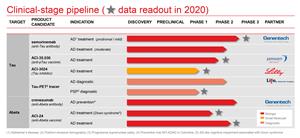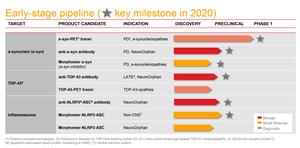AC Immune Reports Top Line Results from TAURIEL Phase 2 Trial Evaluating Semorinemab in Early Alzheimer’s Disease
|
||||||||||
Multiple other clinical stage programs progressing as planned
Investigational new drug (IND) enabling studies ongoing for first-in-class therapeutic candidates targeting TDP-43 and alpha-synuclein
Discovery on novel neuroinflammation target NLRP3-ASC inflammasome, including antibody and small molecule MorphomerTM inhibitors, advancing
LAUSANNE,
Additional data analyses are ongoing and
Prof.
“One of AC Immune’s key strengths is our diversified approach and our broad pipeline of assets, fueled by our remarkably efficient SupraAntigen™ and Morphomer™ platforms and staff. This is evidenced by our novel therapeutic candidates targeting TDP-43 and alpha-synuclein, which have advanced rapidly from discovery into IND-enabling studies. Furthermore, we are particularly pleased with progress in our recently disclosed discovery program targeting the NLRP3-ASC inflammasome,”
Both TDP-43 and alpha-synuclein are major pathologies in NDD and are increasingly thought to be important co-pathologies in AD. AC Immune’s programs directed towards these targets are the most advanced and comprehensive in the field. AC Immune’s alpha-synuclein positron emission tomography (PET) tracer program for Parkinson’s disease (PD) diagnostics was recently recognized by the
Broad Pipeline and Upcoming Milestones in 2020
AC Immune’s additional anti-Tau clinical assets are outlined below as well as additional milestone tables from the broader pipeline.
- ACI-35.030 (anti-Tau vaccine): ACI-35.030 is the first anti-phospho-Tau (pTau) vaccine to reach Phase 2 clinical development. The vaccine generates a polyclonal antibody response that targets epitopes that differ from the epitope targeted by the monoclonal semorinemab. Importantly, these epitopes include an epitope specific to pTau, which is the pathological form of Tau protein responsible for the formation of tangles in AD. Additionally, the antibodies generated by this active immunization approach have pharmacokinetic properties that differ from those of injected semorinemab.
- ACI-3024 (anti-Tau inhibitor): ACI-3024 is a first-in-class small molecule that passes through cell membranes to allow for the inhibition of intracellular Tau aggregates, which is not easily achieved with a large antibody like semorinemab. Phase 1 results in healthy volunteers and data disclosure are expected by Eli Lilly and Company in 2020.
- Tau- PET tracer: AC Immune’s Tau-PET tracer has the potential to work as a critical tool in the further development of anti-Tau approaches by facilitating the design of clinical trials that hit on two key aspects of AC Immune’s Roadmap to Successful Therapies for Neurodegenerative Diseases – treating earlier and targeting more homogeneous populations. PI-2620 is currently being evaluated in a longitudinal Phase 2 study in patients with AD and a Phase 1 study (test/retest) in patients with progressive supranuclear palsy (PSP).
Details of the TAURIEL study
The Phase 2 TAURIEL study of semorinemab is a 73-week, double-blind, placebo-controlled trial to determine if it can slow the rate of clinical decline in early (prodromal to mild) AD. The study followed 457 participants across 97 study centers. The study did not meet the primary efficacy endpoint of reducing decline on Clinical Dementia Rating-Sum of Boxes (CDR-SB) compared to placebo, but did meet the primary safety endpoint. Overall, the incidence of adverse events was similar between semorinemab and placebo arms and further analysis of these safety data are currently underway. Two secondary endpoints, Alzheimer’s Disease Assessment Scale-Cognitive Subscale 13 (ADAS-Cog13) and Alzheimer’s
About
For further information, please contact:
| Head of Investor Relations Phone: +1 917 809 0814 Email: joshua.drumm@acimmune.com |
US Media LaVoie Health Science Phone: +1 617 792 3937 Email: kgallagher@lavoiehealthscience.com |
| Global Head of Communications Phone: +41 79 826 63 82 Email: judith.moore@acimmune.com |
Phone: +41 79 367 6254 Email: chris@lifesciadvisors.com |
Forward looking statements
This press release contains statements that constitute “forward-looking statements” within the meaning of Section 27A of the Securities Act of 1933 and Section 21E of the Securities Exchange Act of 1934. Forward-looking statements are statements other than historical fact and may include statements that address future operating, financial or business performance or AC Immune’s strategies or expectations. In some cases, you can identify these statements by forward-looking words such as “may,” “might,” “will,” “should,” “expects,” “plans,” “anticipates,” “believes,” “estimates,” “predicts,” “projects,” “potential,” “outlook” or “continue,” and other comparable terminology. Forward-looking statements are based on management’s current expectations and beliefs and involve significant risks and uncertainties that could cause actual results, developments, and business decisions to differ materially from those contemplated by these statements. These risks and uncertainties include those described under the captions “Item 3. Key Information – Risk Factors” and “Item 5. Operating and Financial Review and Prospects” in AC Immune’s Annual Report on Form 20-F and other filings with the
Photos accompanying this announcement are available at
https://www.globenewswire.com/NewsRoom/AttachmentNg/13290144-c3a0-4e65-b079-eb5cc2484149
https://www.globenewswire.com/NewsRoom/AttachmentNg/bc21e9b8-1152-488a-b719-cb667d4cf9ab
Source: AC Immune SA

